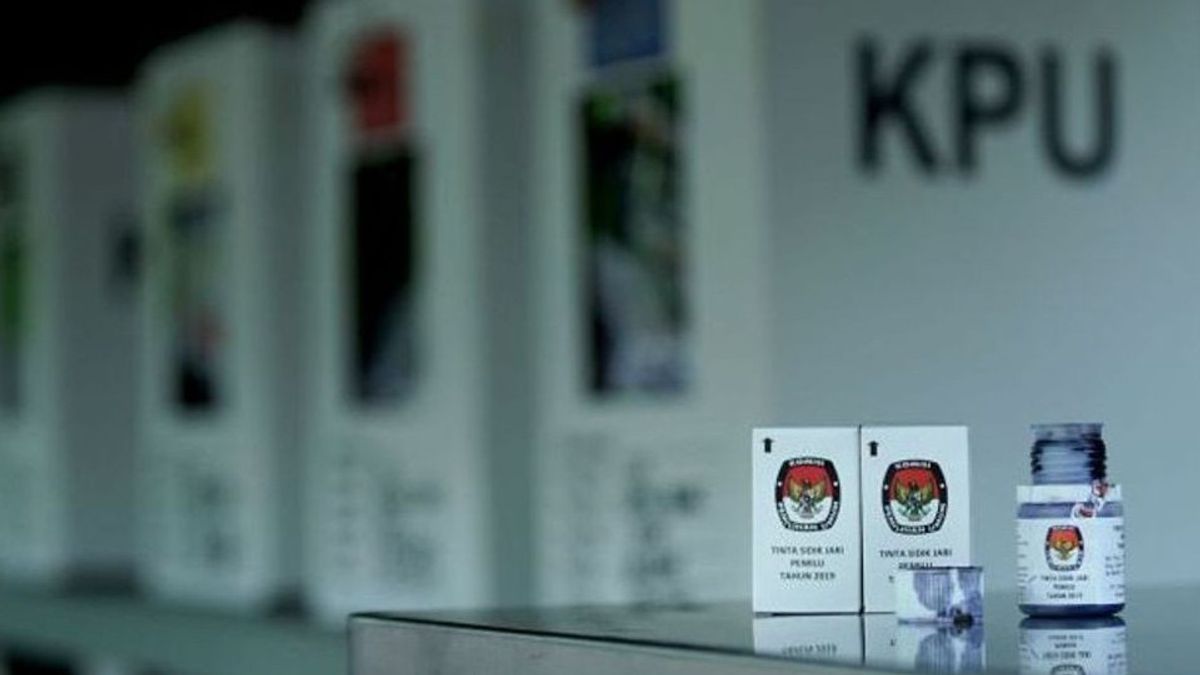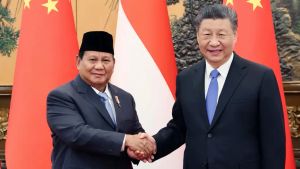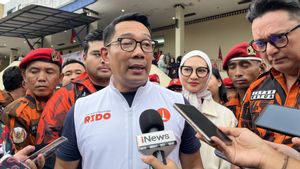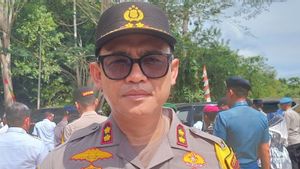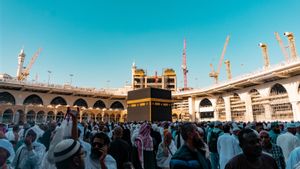JAKARTA - Coordinating Minister for Political, Legal and Security Affairs Mahfud MD could not stop thinking about the decision of the South Jakarta District Court Panel of Judges which won the Fair and Prosperous Party (Prima) lawsuit against the General Election Commission (KPU). Even more surprising, the judge asked the KPU to postpone the 2024 election.
"Punishing the defendant (KPU) not to carry out the remaining stages of the 2024 General Election since this decision was pronounced and carrying out the General Election stage from the beginning for approximately 2 years 4 months seven days," reads a copy of the decision of the Panel of Judges chaired by T. Oyong on March 2, 2023.
In fact, according to Mahfud, the District Court (PN) does not have the authority to make the verdict. This is because disputes related to the process, administration, and election results are regulated separately. Competency over election disputes is not in the District Court.
Disputes before voting if it is related to the administrative process that decides must be carried out by Bawaslu, but if it is about the decision of the most distant participation, it can only be sued by the Administrative Court.
"Well, the Prima Party has lost a dispute in Bawaslu and has lost in the Administrative Court. That is the settlement of administrative disputes if it occurs before the vote. Meanwhile, if there is a dispute after the vote or dispute over the election results, it becomes the competence of the Constitutional Court (MK). That's the standard," Mahfud said on his Instagram account on March 2, 2023.
There is no competence in the General Court. Civil acts against the law cannot be used as an object to the KPU in the implementation of the General Election. In that sense, the penalty for postponing the General Election or all processes cannot be imposed by the District Court as a civil case.
"There is no penalty for postponement of elections that can be determined by the District Court. Postponement of voting in elections can only be applied by the KPU," said Mahfud.
Constitutional Law Expert Prof. Yusril Ihza Mahendra was surprised why the South Jakarta District Court Panel of Judges did not reject the Prima Party's lawsuit, but instead won it. In fact, PN is not authorized to try the case.
The lawsuit filed by the Prima Party is a civil lawsuit related to an ordinary unlawful act, not a lawsuit against the law by the authorities.
"So, the decision in the civil dispute only binds the plaintiff and defendant. It does not bind to other parties, both candidates and those who have been designated as election participants," he said as quoted by Antara.
Moreover, when referring to Law Number 7 of 2017 concerning Elections, there are only 2 types of postponement of Elections. First, the follow-up elections, held in terms of part or all parts of Indonesia, riots occurred, security disturbances, natural disasters, or other disturbances that resulted in some stages of holding the election not being implemented. Follow-up elections are held from the stage of holding the stopped elections.
The two follow-up elections were held when part or all parts of Indonesia rioted, disturbances of security, natural disasters, or other disturbances that resulted in all stages of holding elections unable to be carried out. The implementation of the follow-up elections is carried out for all stages of holding elections.
The postponement of elections is only because the civil lawsuit of political parties is not only against the law but also against the constitution, Mahfud continued.
Article 7 of the 1945 Constitution has mandated the President and Vice President to hold office for five years, and thereafter can be re-elected in the same office only for one term.
The regulation is the result of the first constitutional amendments on October 14-21, 1999.
Article 22E, Paragraph (1) also states that General Elections are held directly, in general, free, secret, honest, and fair once every five years. The rules for holding the General Election are also strengthened in Article 167 Paragraph (1) of Law Number 7 of 2017 concerning General Elections,
"So, the PN's verdict cannot be requested for execution. It must be fought legally and the people can refuse massively if it is to be executed. Why? Because the right to conduct elections is not a civil right of the KPU," said Mahfud.
The issue of postponement of the 2024 General Election continues and it seems as if there are parties who forced it. In fact, member of Commission III of the DPR Benny K Harman during a working meeting with the Head of the Financial Transaction Reports and Analysis Center (PPATK) on February 14 accused that there were large funds prepared to make it a success.
Whether true or not, what is certain is that there is no relevant reason for the constitution to postpone the 2024 General Election.
Executive Director of Indonesia Political Review, Ujang Komarudin, told VOI on December 9, 2022, that if it was only an excuse for economic recovery, would there be any guarantee that the economy would improve if the election was postponed?
So is the budget. If it is really limited, the government just has to postpone projects that use the APBN budget. In fact, extending the position of President or delaying the 2024 election is a form of constitutional betrayal.
According to Yusril, the postponement of the 2024 General Election may only get validity and legitimacy if it is carried out in three ways. The first amendment to the 1945 Constitution.
What needs to be changed is not actually changing the current articles of the 1945 Constitution literally, but adding a new article in the 1945 Constitution related to general elections. Article 22E of the 1945 Constitution can be added a new paragraph, namely paragraph (7) and paragraph (8) which contains norms.
Paragraph (7) can be read, in the event that the implementation of the general election once in five years as referred to by Article 22E paragraph (1) cannot be carried out due to war, rebellion, widespread security disturbances, natural disasters and disease outbreaks that are difficult to overcome, the People's Consultative Assembly has the authority to postpone the implementation of elections until a certain time limit.
Paragraph (8), all state positions whose fillings are carried out through general elections as stipulated in this basic law, temporarily remain in office as temporary officials until the general election is held.
"With the addition of 2 paragraphs in Article 22E of the 1945 Constitution, there is no term for extending the term of office of the President, MPR, DPR, DPD, and DPRD. Members of State Institutions such as the MPR, DPR, the DPD changed their status to temporary members, before being replaced with members of the election results," said Yusril in his writing in February 2022.
Their status is the same as that of members of the Central Indonesian National Committee (KNIP) in the early days of independence, members of the DPRS during the Liberal Democracy and members of the MPRS during the Old Order and early New Order. The positions of President Joko Widodo and Ma'ruf Amin were also Presidential Officials and Vice Presidential Officials, as were President Suharto's officials at the beginning of the New Order.
Second, through the President's decree. Decree is a legal revolution, whose validity must be seen in a post-factum manner. The legal revolution cannot be successful without military support. This is the history of 1959. Before President Soekarno issued a decree, the Chief of Staff of the War Force General AH Nasution first declared the country in a state of danger. Political parties, especially the PNI and PKI, also support it.
"My guess is that President Joko Widodo will not do that. The political risk is too big," said Yusril.
Moreover, Jokowi has repeatedly stated that no one will voice an extension of the term of office of the President or the postponement of the election.
Third, creating a constitutional convention. The practice of state administration, which is different from what is regulated in the constitution in the history of Indonesian state administration, was only made by the Government's announcement, namely the Declaration of Vice President No X dated October 16, 45. The architect of the change is Sutan Sjahrir.
The first election, which is planned to be held on February 1, 1946, has finally withdrawn. Additional rules will only apply for two or six months, eventually taking effect until they are replaced by the RIS Constitution on December 27, 1949.
However, this happened only in conditions of war. Yusril explained that it was difficult for current eras to do, 'People already understand better how to organize the country than the 1945-1949 revolution era.'
The English, Chinese, Japanese, Arabic, and French versions are automatically generated by the AI. So there may still be inaccuracies in translating, please always see Indonesian as our main language. (system supported by DigitalSiber.id)
